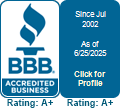The global pandemic has not only caused health and economic issues, but also opened uncertain American’s up to a host of fraud. Everything from fake COVID home-tests and cures to emails claiming to be from the IRS, American’s are under attack by criminals looking to steal identities and make a quick buck at your expense.
The Federal Trade Commission recently reported that already nearly $13 million has been stolen from victims, with a median loss of $570 per person who reported the fraud (FTC, April 12, 2020). It’s likely some victims didn’t report their losses so that figure could actually be much higher.
Here are a few things to watch out for:
Communication claiming to be from the IRS: Whether by phone, text or email, fraudsters are impersonating the IRS claiming they need you to verify your identity, requiring you to provide account information, or even claiming you owe taxes on your stimulus payment. They threaten that if you do not give them the information, you will be arrested or will not receive future payments. In another twist of this scam, people are told to go to a certain website, download an app from the site to pay taxes immediately.
Cures and home testing kits: Be cautious of anyone selling products that claim to prevent, treat, diagnose, or cure COVID-19. In recent cases, scammers reportedly contacted people by phone or email claiming to be from the CDC. The caller claimed to have approved products to reduce infection risks or that home testing kits were now available.
In other cases, people were told that the caller was from Medicaid and if the victim didn’t agree to pay for cures or tests that their policy would be cancelled. The catch – you have to provide your account details or credit card number immediately as “supplies are very limited.” Each victim had their account debited as a result, and of course nothing was delivered.
Phishing: Emails or text messages aimed at getting you to 1. Divulge personal information, like your social security number, 2. Provide account or credit card information, and/or 3. Click links or download attachments that can infect your computer. Phishing runs the gambit, but there are a few indicators you’re being phished:
• It is an unsolicited email or text, and from a group you do not do business with
• It claims to be from a federal agency like the FBI, IRS, or CDC
• It demands quick action (they don’t want you to talk to anyone about it and learn it’s a scam!) – this demand is complete with a threat. For ex: If you don’t click the link within 24 hours and provide your account details, you will not receive a stimulus payment!
What you can do:
• Stay sharp! With so many of us turning to the internet to work, provide homeschooling for kiddos or even just occupy our time, fraudsters are looking to take advantage of you.
• Remember that the IRS will not contact you via email, text or thru social media asking for personal or account information.
• Just hang up! If you are uncertain, you can contact the agency directly to determine if someone from there was really trying to contact you. For example, you can contact Medicaid or the IRS directly.
• Don’t supply personal information or account details unless you initiate the conversation.
• Do your research. Soon after people started receiving text messages claiming Costco was giving away $5,000 gift cards, it was in the news and available for all to see that it was a scam.
• If in doubt, contact someone like your financial advisor, local police department, or Credit Union. They will help you uncover if it sounds like a scam.
• If you provided your identity or account details to anyone and now think it was a scam, contact your Credit Union immediately!
• Delete the email or text and do not click the links contained in it. This is how fraudsters often infect your devices and steal information.
• Report actual or attempted fraud to the Federal Trade Commission. The link is on their website.
Learn more:
• TIGTA: https://www.treasury.gov/tigta/contact_report_scam.shtml
• FBI: www.fbi.gov
• Federal Trade Commission: https://www.ftc.gov/coronavirus
• CDC: https://www.cdc.gov/media/phishing.html
• IRS: https://www.irs.gov/newsroom/tax-scams-consumer-alerts
Finally, always check the facts with a reliable source. Never rely on information on a social media site.



